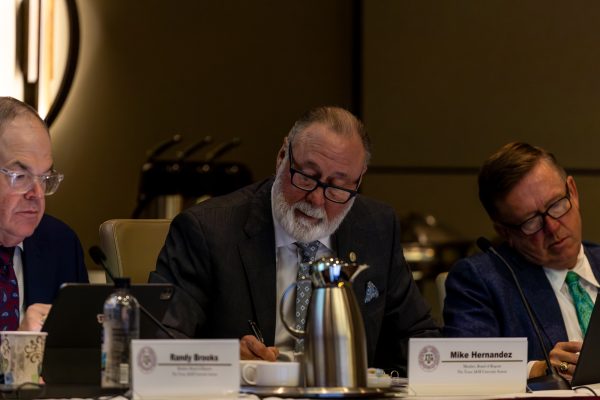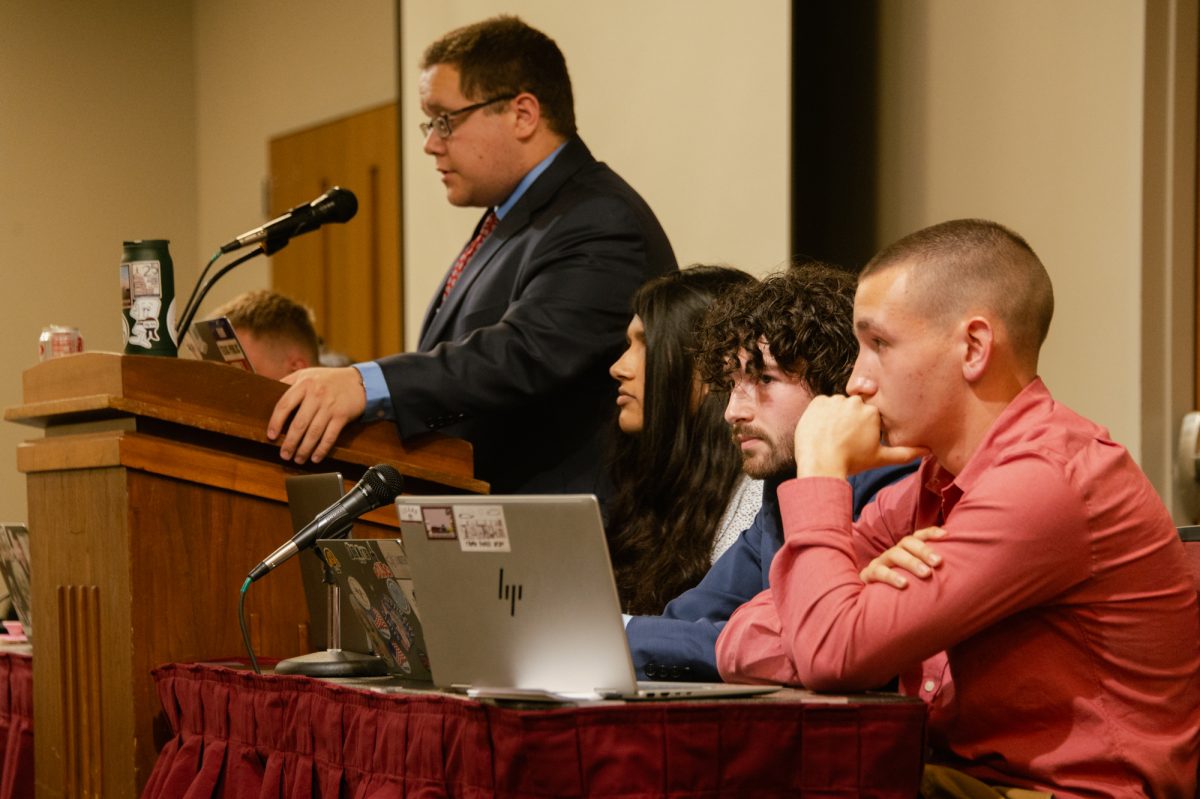The Texas A&M System Board of Regents passed a resolution directing President Mark Welsh III to “take actions necessary to eliminate” 14 minors and 38 certificates during Thursday’s meeting.
The unprecedented action follows weeks of controversy and faculty criticism, as A&M’s Executive Vice President and Provost Alan Sams seeks to end 52 programs not meeting enrollment thresholds the Office of the Provost developed. The proposal breaks with established norms, as curricular changes historically begin at the faculty level.
According to previous statements shared by an A&M spokesperson, inquiries into the LGBTQ studies minor in June 2023 prompted an investigation into programs with low enrollment or few graduates. Working with the deans, Sams directed the provost’s office to develop a process to inactivate these “low-producing programs.”
The provost ordered deans to inform faculty to begin the inactivation process at the beginning of the fall semester with a deadline of late September. As previously reported by The Battalion, when faculty in the Women’s and Gender Studies program refused to inactivate the LGBTQ studies minor, a dean, under orders from the provost’s office, submitted the request in their stead.
According to the resolution, of 26 university minors facing inactivation, faculty members appealed 16, of which Sams denied four: LGBTQ studies, global health, Asian studies and geophysics. Of the 27 certificate inactivation appeals, Sams denied 21 and saved six.
Faculty members have criticized the new thresholds, saying excluding them from the process violates shared governance, especially because it involves curricular processes. Most only learned about the new enrollment thresholds when ordered to end minors and certificates. At the Oct. 14 Faculty Senate meeting, senators grilled Sams for almost two hours, arguing against the proposal. Previously, the Speaker of the Faculty Senate Angie Hill Price called it a “deeply flawed” process that “lacked meaningful input from many stakeholders.”

When faced with an open records request seeking information about the Council of Deans subcommittee that developed the thresholds under orders from Sams, university officials requested the Office of the Attorney General intervene. The state office denied the request due to legal exemptions, claiming it “relates to policymaking because it concerns the overall administration of Texas A&M University’s academic programs.”
“Specifically, the information pertains to Texas A&M University’s policies for phasing out or continuing low enrollment minors or certificate programs,” the Office of the Attorney General’s report reads. “The noted information … reflects advice, opinions, and recommendations of university administrators on policies that have not yet been implemented.”
After a lull following October’s Faculty Senate meeting, the Board of Regents unveiled its agenda last week, which, included the resolution that, if passed, would force Welsh to support the inactivations. The resolution notes Welsh believes “the current review process [should] be halted and restarted” with input from the Faculty Senate but that the Board of Regents disagreed and that there has been “sufficient faculty review,” overruling the president.
The resolution directs Chancellor John Sharp to revise A&M System policy to include standards for low-producing minors and certificates. It also directs the Board of Regents to inform presidents of other universities under the A&M umbrella to review minors and certificates “to identify any low-producing programs that may require elimination.”
According to the Faculty Senate’s bylaws, the Executive Committee, or EC — which includes the senate’s top officials, including its speaker, Price — may act on the senate’s behalf during emergencies. Because of the nature of the resolution, the EC convened on Tuesday to reject the inactivation of minors and certificates the Faculty Senate would have reviewed on Nov. 11. According to A&M’s Standard Administrative Procedure, or SAP, inactivations must pass the Faculty Senate before being finalized.
In her announcement sharing the decision, Price said the EC took the emergency action when notified of the pending resolution if “the Regents’ resolution would circumvent the senate’s ability to vote on these agenda items.”
“At our last Faculty Senate meeting, many Senators, on behalf of their constituents and themselves, expressed concern about the Provost’s process to eliminate what he identified as low-performing minors and certificates,” Price said. “Numerous other faculty have also expressed dismay to Senators. The Provost opted to keep the Faculty Senate uninformed about the development of the process, choosing to leave our Faculty out of the important role they play in oversight of the curriculum.”
Price said the provost’s process “ignored significant data on numerous programs,” such as student enrollment in courses associated with minors and certificates, the time it takes to complete certain programs and obstacles to enrollment in recently created programs, “including the fact that students are typically advised to declare a minor just before applying for graduation.”
“The Provost originally claimed that the discontinuation was for fiscal reasons, yet has not provided the campus with any data backing up his claim that inactivating these minors or certificates will save the University or its students and taxpayers money,” Price said. “These changes could very well cost students and taxpayers money.”

She claims the shorter-than-two-year timeframe programs have available to demonstrate acceptable enrollment numbers is at odds with timetables used by the Texas Higher Education Coordinating Board, which allows bachelor’s degrees five years to grow before reviewing them for low performance. The state board does not mandate enrollment thresholds for minors or certificates. The speaker also claimed Sams violated SAP 11.99.99.M0.01, which explains the review process used to inactivate programs at A&M.
According to Price, abiding by the SAP is part of what A&M submits to SACSCOC, which accredits higher education institutions. She also claimed the provost’s office ignored the Association of American Universities’ statement on Academic Principles, which advocates for faculty control of curriculum and strong shared governance procedures.
“As the representative body of our Faculty, The Senate and its EC is deeply concerned for our University and the reputational risk that the Provost’s proposal represents,” Price said. “The EC is concerned that The Board of Regents may not be fully aware of the deeply flawed process and the ramifications of the Provost’s decisions. We do not oppose the concept of a process, but we vehemently oppose the one that was implemented by the Provost with little consideration of the consequences.”
Before the vote, multiple faculty members stepped up during a public testimony segment led by Regents Chairman Bill Mahomes to speak, beginning with two members of the Women’s and Gender Studies program. The program’s director, Theresa Morris, criticized the resolution and decision to shut down the minor.
“All of the LGBTQ minor curriculum courses are part of an existing curriculum,” Morris said. “The marginal cost of those courses is zero dollars.”
Price stepped forward and said passing the resolution would endanger A&M’s accreditation because it takes curricular decisions out of faculty hands.
“We’re afraid of knowledge, and that’s not what a leading institution should be,” Price said.
The Faculty Senate’s speaker-elect, Andrew Klein, shared similar accreditation worries. He said it seems the enrollment thresholds were created to target the LGBTQ studies minor. Leonard Bright, a professor in the Bush School of Government and Public Service stepped up to oppose the resolution, alleging that outside political influence influenced the decision and that approving the resolution would contribute to growing faculty disapproval.
“This is not how a great educational institution should operate,” Bright said.
Regent Bob Albritton said the resolution was not about eliminating the LGBTQ studies minor. Faculty began laughing at Albritton after he made incorrect statements about the enrollment thresholds, including saying the thresholds counted the last five years rather than two years, the correct number.
Afterward, the Board of Regents passed the resolution mandating President Mark Welsh III “take actions necessary to eliminate” 14 minors and 38 certificates in a quick, unanimous vote. The decision was met with gasps by faculty.
Editor’s note: This story was published prior to the Board of Regents meeting and was updated live during it on Nov. 7, 2024. Further updates will be published in other stories.























Rich • Nov 12, 2024 at 4:36 pm
The BOR did the right thing. Let’s not forget that they have a fiduciary responsibility to ensure the proper spending of Texas taxpayer dollars.
L Speer • Nov 9, 2024 at 6:27 am
Excellent decision! There’s a time, and it’s now, to stop giving liberal agendas any place in academia. Stop trying to indoctrinate the young sons and daughters created by God!
Ed Ucator • Nov 11, 2024 at 4:47 pm
You realize that academia is voluntary, right? And that you get to choose which classes you take?
Joe • Nov 11, 2024 at 8:30 pm
Well Ed, why should the university continue to allocate and expense these classes if there’s little or no signup. Doesn’t that mean very few are impacted?
Seymour Butts • Nov 12, 2024 at 7:49 pm
Well Joe, as the article states, the classes themselves are not being removed. They actually have to meet criteria to “make” at the beginning of each semester. You share the same fundamental misunderstanding as the BoR — the classes aren’t going away, only the degree or certificate awarded in recognition of completing the classes. Students regularly wait until their junior or senior year to have the certs or minors added. All the BoR has done is undermine the academic freedom of the university, and punish students who will no longer receive a degree/certificate for classes they’ve paid to take.